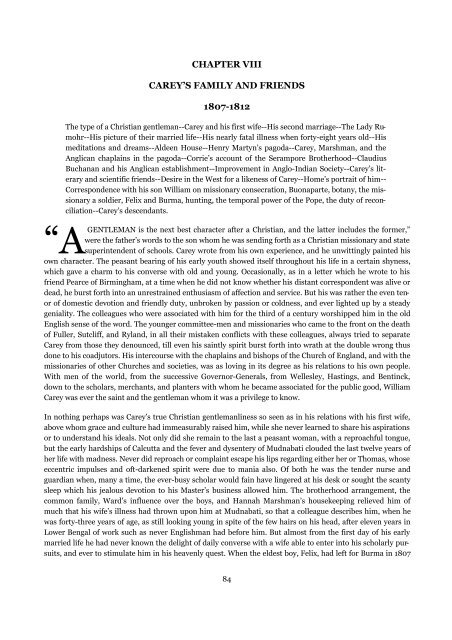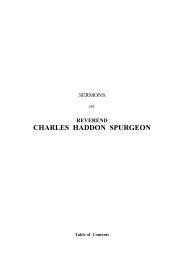Life of William Carey by George Smith - The Jesus Army
Life of William Carey by George Smith - The Jesus Army
Life of William Carey by George Smith - The Jesus Army
You also want an ePaper? Increase the reach of your titles
YUMPU automatically turns print PDFs into web optimized ePapers that Google loves.
CHAPTER VIII<br />
CAREY’S FAMILY AND FRIENDS<br />
1807-1812<br />
<strong>The</strong> type <strong>of</strong> a Christian gentleman--<strong>Carey</strong> and his first wife--His second marriage--<strong>The</strong> Lady Rumohr--His<br />
picture <strong>of</strong> their married life--His nearly fatal illness when forty-eight years old--His<br />
meditations and dreams--Aldeen House--Henry Martyn’s pagoda--<strong>Carey</strong>, Marshman, and the<br />
Anglican chaplains in the pagoda--Corrie’s account <strong>of</strong> the Serampore Brotherhood--Claudius<br />
Buchanan and his Anglican establishment--Improvement in Anglo-Indian Society--<strong>Carey</strong>’s literary<br />
and scientific friends--Desire in the West for a likeness <strong>of</strong> <strong>Carey</strong>--Home’s portrait <strong>of</strong> him--<br />
Correspondence with his son <strong>William</strong> on missionary consecration, Buonaparte, botany, the missionary<br />
a soldier, Felix and Burma, hunting, the temporal power <strong>of</strong> the Pope, the duty <strong>of</strong> reconciliation--<strong>Carey</strong>’s<br />
descendants.<br />
“A<br />
GENTLEMAN is the next best character after a Christian, and the latter includes the former,”<br />
were the father’s words to the son whom he was sending forth as a Christian missionary and state<br />
superintendent <strong>of</strong> schools. <strong>Carey</strong> wrote from his own experience, and he unwittingly painted his<br />
own character. <strong>The</strong> peasant bearing <strong>of</strong> his early youth showed itself throughout his life in a certain shyness,<br />
which gave a charm to his converse with old and young. Occasionally, as in a letter which he wrote to his<br />
friend Pearce <strong>of</strong> Birmingham, at a time when he did not know whether his distant correspondent was alive or<br />
dead, he burst forth into an unrestrained enthusiasm <strong>of</strong> affection and service. But his was rather the even tenor<br />
<strong>of</strong> domestic devotion and friendly duty, unbroken <strong>by</strong> passion or coldness, and ever lighted up <strong>by</strong> a steady<br />
geniality. <strong>The</strong> colleagues who were associated with him for the third <strong>of</strong> a century worshipped him in the old<br />
English sense <strong>of</strong> the word. <strong>The</strong> younger committee-men and missionaries who came to the front on the death<br />
<strong>of</strong> Fuller, Sutcliff, and Ryland, in all their mistaken conflicts with these colleagues, always tried to separate<br />
<strong>Carey</strong> from those they denounced, till even his saintly spirit burst forth into wrath at the double wrong thus<br />
done to his coadjutors. His intercourse with the chaplains and bishops <strong>of</strong> the Church <strong>of</strong> England, and with the<br />
missionaries <strong>of</strong> other Churches and societies, was as loving in its degree as his relations to his own people.<br />
With men <strong>of</strong> the world, from the successive Governor-Generals, from Wellesley, Hastings, and Bentinck,<br />
down to the scholars, merchants, and planters with whom he became associated for the public good, <strong>William</strong><br />
<strong>Carey</strong> was ever the saint and the gentleman whom it was a privilege to know.<br />
In nothing perhaps was <strong>Carey</strong>’s true Christian gentlemanliness so seen as in his relations with his first wife,<br />
above whom grace and culture had immeasurably raised him, while she never learned to share his aspirations<br />
or to understand his ideals. Not only did she remain to the last a peasant woman, with a reproachful tongue,<br />
but the early hardships <strong>of</strong> Calcutta and the fever and dysentery <strong>of</strong> Mudnabati clouded the last twelve years <strong>of</strong><br />
her life with madness. Never did reproach or complaint escape his lips regarding either her or Thomas, whose<br />
eccentric impulses and <strong>of</strong>t-darkened spirit were due to mania also. Of both he was the tender nurse and<br />
guardian when, many a time, the ever-busy scholar would fain have lingered at his desk or sought the scanty<br />
sleep which his jealous devotion to his Master’s business allowed him. <strong>The</strong> brotherhood arrangement, the<br />
common family, Ward’s influence over the boys, and Hannah Marshman’s housekeeping relieved him <strong>of</strong><br />
much that his wife’s illness had thrown upon him at Mudnabati, so that a colleague describes him, when he<br />
was forty-three years <strong>of</strong> age, as still looking young in spite <strong>of</strong> the few hairs on his head, after eleven years in<br />
Lower Bengal <strong>of</strong> work such as never Englishman had before him. But almost from the first day <strong>of</strong> his early<br />
married life he had never known the delight <strong>of</strong> daily converse with a wife able to enter into his scholarly pursuits,<br />
and ever to stimulate him in his heavenly quest. When the eldest boy, Felix, had left for Burma in 1807<br />
84
















